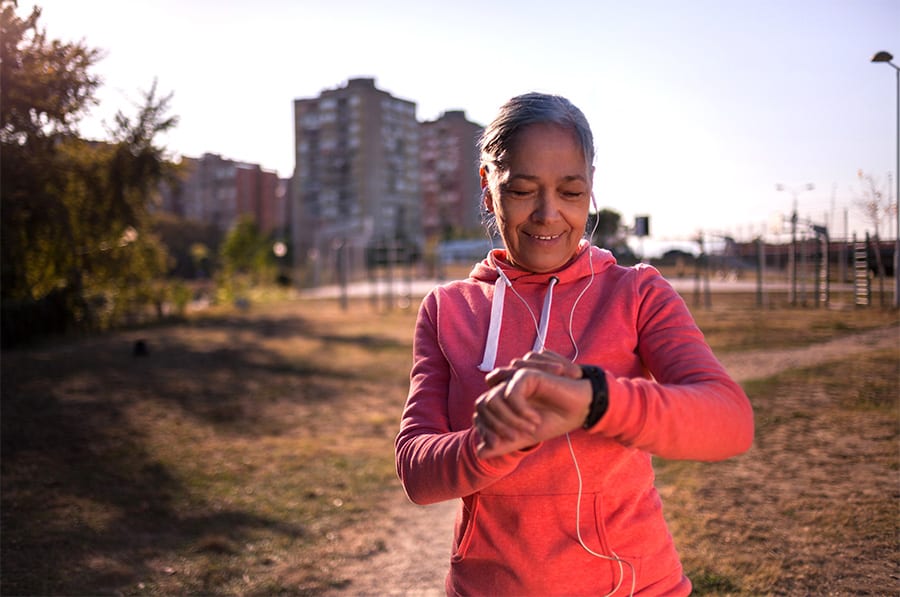Pioneering wearables study that helps prevent falls among elderly people receives £750k funding

An Edinburgh-based start-up using artificial intelligence (AI) to help older people live independently for longer has landed £750,000 in funding to explore the use of commercially available wearable technologies to predict the risk of falls and other age-related health issues.
Smplicare, founded in 2021, will use the funds from UK Research & Innovation (UKRI) and private investors for one of the UK’s largest research engagements of its kind involving AI, wearables, and older adults.
At the conclusion of the study, the start-up plans to launch its digital platform inspiring older people to better manage their own health for widespread use in 2023.
As part of the study, 300 individuals over 55 years old with a recent history of falls will be given a mainstream wearable device – such as Fitbit, Garmin, or Polar – to produce data that will enable Smplicare to create an AI-powered algorithm that can predict and proactively alert to the likelihood of a future fall.
Garrett Sprague, CEO and Co-Founder of Smplicare, said: “People often say ‘older adults don’t use technology’. That’s just not true anymore. Technology spending for adults over 65 – including wearables – exploded during the pandemic, up 350 percent by some estimates.
“It’s not that older people don’t use technology – the reality is that they have a low tolerance for bad technology. Smplicares’ technology is simple and allows users to monitor and manage their own health data via our bespoke mobile dashboard which is co-designed alongside older adults.”
The latest UK Government figures show close to a third of over-65s and half of over-80s fall at least once per year, incidents that cost the NHS more than £4.4 billion annually. UK Government data also estimates that the older population will grow by more than five million people by 2043, placing huge added pressure on the NHS and health boards as age-related issues and illnesses rise.
Initially, the study will focus on better predicting the likelihood of falls, but the company will also gather a range of valuable insights impacting the UK’s elderly population such as body composition, digital inclusion, and behaviour change.
Garrett continued: “Our goal at Smplicare is to empower the future of independent ageing. By using everyday wearables and digital health devices we’re harnessing the data from devices people already have, to deliver actionable insights that promote wellbeing as we age.
“The need is immediate and immense, given the rapidly ageing population. This study is one of the largest ever conducted, and it will provide a huge amount of data that we will use to develop better and better tools to enable individuals to manage their personal health and maintain their independence in later life.”
Smplicare is supported in the study by a team of data scientists at The Data Lab, Scotland’s Innovation Centre for Data and AI, who will analyse user data and validate the AI-powered models.
Brian Hills, CEO of The Data Lab, added: “With pressure growing on the UK’s hospitals, care providers and health boards, this is exactly the type of data-driven innovation the country needs right now.
“As an ageing nation, we will face multiple health-related challenges in future. AI and data analytics are quickly becoming a go-to approaches to provide solutions to help solve these.
“Smplicare’s unique approach is squarely focused on improving people’s lives in a meaningful and practical way – a great example of using AI for the greater good.”
The £750,000 funding came as part of UKRI’s ‘Healthy Ageing Challenge’, which supports the UK Government’s ‘Grand Challenge’ of adding five years of healthy, independent life by 2035. 70 percent of the funding is supported by the grant and 30 percent has been provided by private investors.
UKRI Healthy Ageing Challenge Director George MacGinnis has previously written an exclusive article for AT Today about the essential role of assistive technologies, like Smplicare’s ground-breaking wearable study, in cutting later life NHS dependency.
From high-tech solutions like bionic arms to everyday home solutions like Alexa, George touches on the broad range of assistive technologies available that support healthy ageing and independence, and reduce demand on overstretched health and care services.

